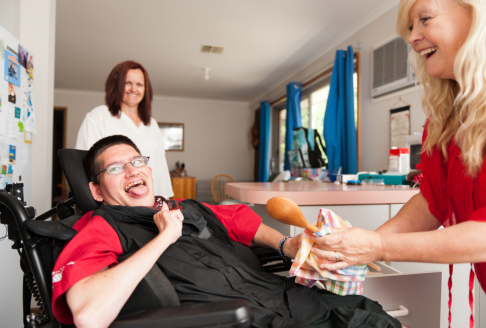Are you eligible for a Companion Card?
- 06 Dec 2023

The Companion Card program is a national program providing eligible people with a disability who require attendant carer support to participate in community events and activities with a complimentary second ticket for their carer.
The program is designed to support social inclusion for people with disabilities (including older people living with a disability) and their carers. Each Australian state and territory administers its own Companion Card program and while this article focuses on the Victorian program, we’ve included some useful links to programs in other states for your information.
Who is eligible for a Companion Card?
To be eligible for the Victorian Companion Card, you must:
- live in Victoria and be a permanent resident/citizen of Australia
- have a significant, permanent disability that requires a lifelong need for a high level of support to participate in venues and events.
More information on eligibility is available at the Companion Card website here.
How do I apply for a Companion Card?
You can apply for a Companion Card using a hard copy form or you can apply online here. You can also call 1800 650 611 and ask for a hard copy form to be sent to you. Applications take a minimum of six weeks to be assessed.
Where can I use my Companion Card?
The Companion Card can be used at a range of participating venues, including cinemas, theatres, sporting events and more. The card can also be used on all Victorian public transport services. You can find a current list of businesses that participate in the Companion Card program here.
How do I use my Companion Card?
Each venue that participates in the Companion Card program may have different approaches to booking, for example, via telephone, online or by picking up tickets on the day of the event.
If you are booking a ticket via telephone, please advise the Customer Service Representative that you require a Companion Card. They may ask for your name, Companion Card number and expiry date. You may also be asked to present your Companion Card when purchasing a ticket in person.
When booking online, some venues provide Companion Card booking information on their websites under headings such as ‘accessibility bookings’.
Where can I read more about the Victorian Companion Card program?
Click here for more detailed information on eligibility, application process and participating venues. While the information provided in this article is accurate at the time of publication, programs can change, so it’s important to access the latest information on the Companion Card website.
I don’t live in Victoria – where can I find information about the Companion Card in my state/territory?
If you live outside of Victoria, find links to the Companion Card program in other Australian states and territories here.
Community news
-

Back to School Tips for Foster and Kinship Carers
Heading back to school can be exciting, but it can also bring up big feelings—especially for kids in care. Here are a few simple ways to help make the transition smoother.
- 17 Apr 2025
-

Easter Reflection from Emily Booth of our Spiritual Care Team
A few years ago, at Easter, I was staying with my sister and her family for the weekend. One afternoon we were all sitting around chatting and the kids were playing when my sister came into the room and placed a tray of fresh, warm hot cross buns on the table
- 16 Apr 2025
-

Student Volunteer Spotlight - Erin
Did you know that Baptcare has student volunteers at some of our Residential Aged Care communities? Our volunteers are an integral part of our Baptcare community, not only in residential aged care but across many of our programs and services. Volunteers provide essential connection, positivity and assistance to residents, clients and consumers.
- 04 Apr 2025
